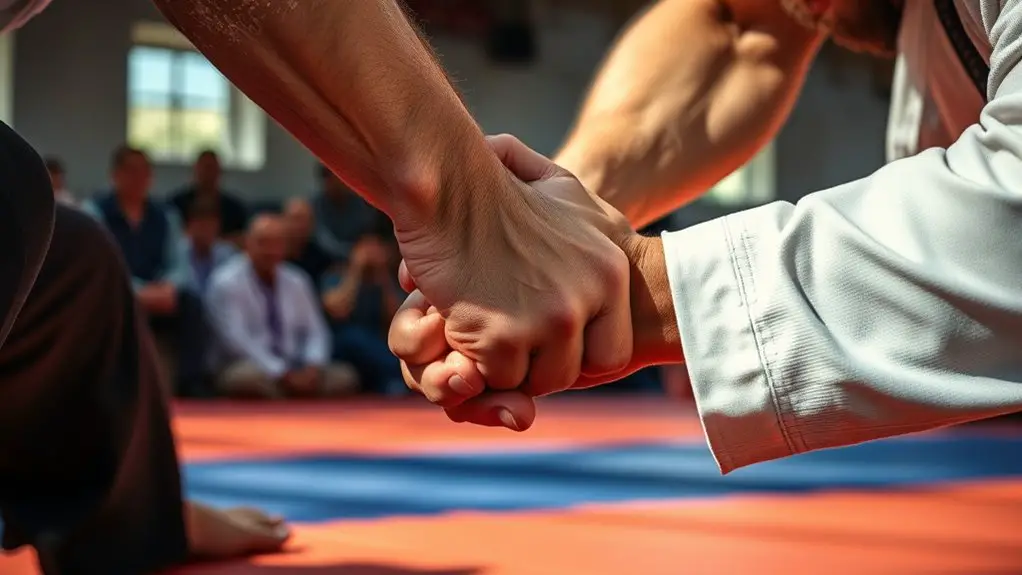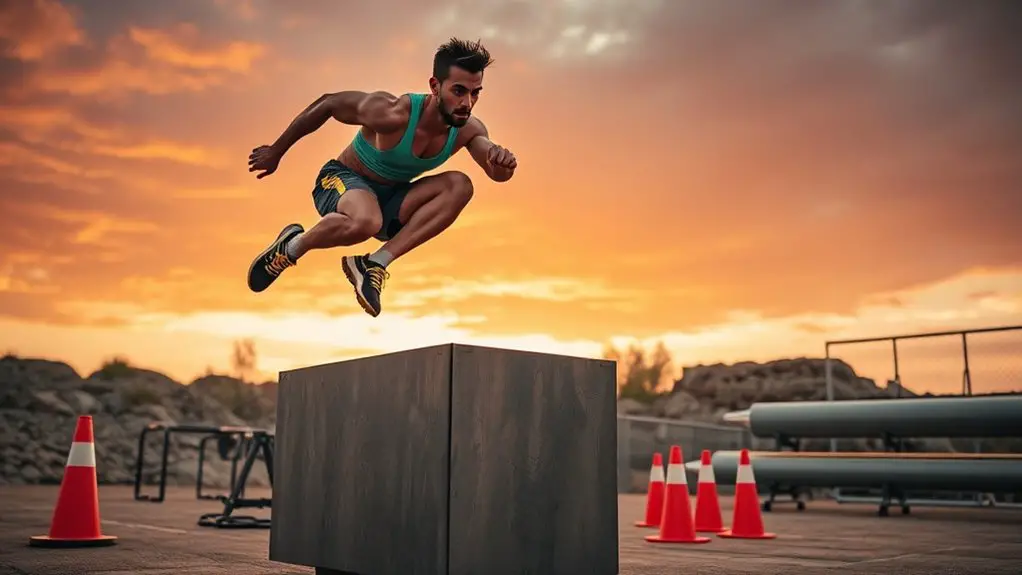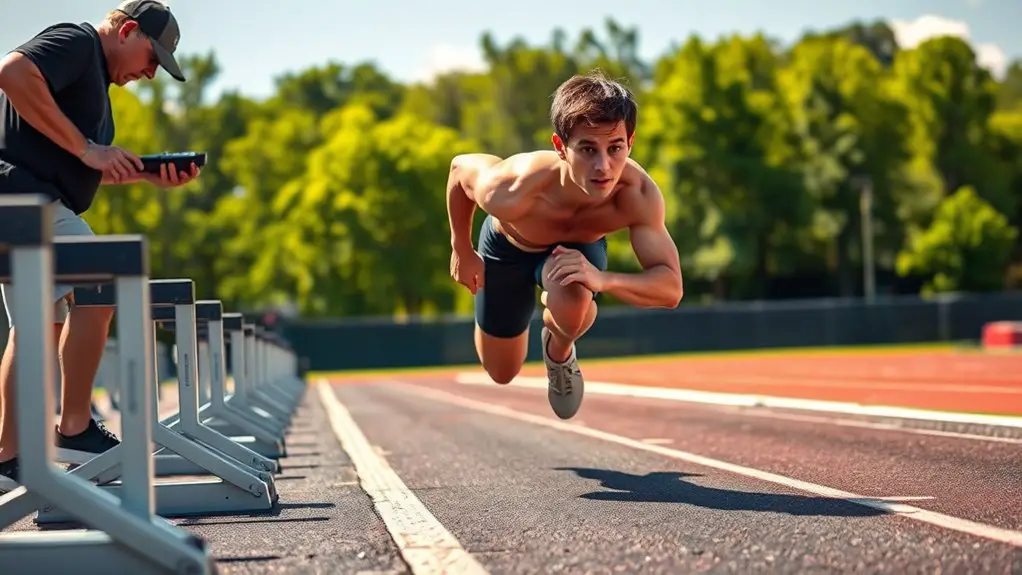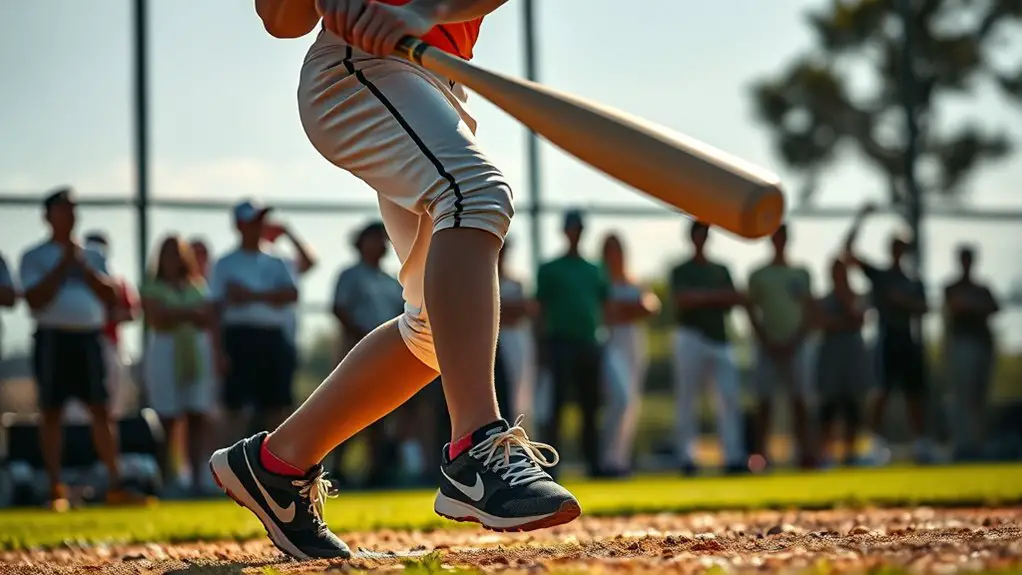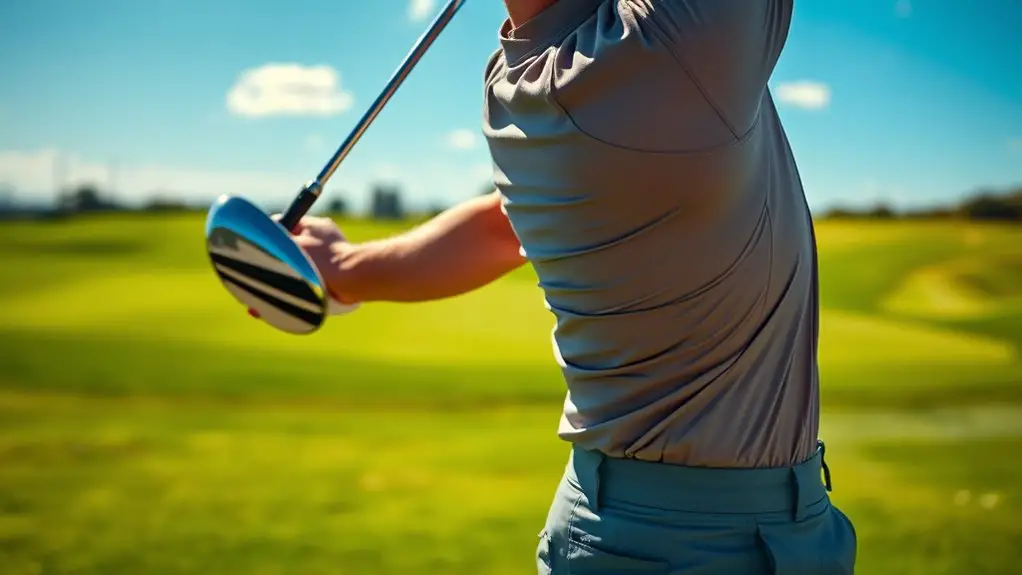Grip strength is essential in jiu-jitsu and wrestling. It helps you control opponents, maintain positions, and execute techniques with confidence. A strong grip enhances endurance, reducing fatigue during matches and keeping your holds secure. Techniques like takedowns and submissions rely heavily on grip strength for leverage and control. By building your grip, you'll enhance your overall performance on the mat. Discovering effective training methods can further elevate your game and open up new possibilities.
The Importance of Grip Strength in Grappling Sports
While many aspects of grappling sports require technique and strategy, grip strength often serves as the foundation for success. It's that vital element that can give you the edge in a match, allowing you to control your opponent and dictate the pace. When you've got solid grip endurance, you can maintain control longer, making it harder for your opponent to escape or counter your moves.
Proper hand positioning plays a significant role here; it's not just about how hard you grip, but how you grip. Whether you're clinching, pulling, or pushing, your hands need to be strategically placed to maximize effectiveness. This freedom in movement, combined with a strong grip, empowers you to execute techniques with confidence. By focusing on building your grip strength, you're laying the groundwork for a dominant performance in Jiu-Jitsu or wrestling, enabling you to express your skills without limitations. Additionally, developing grip strength improves overall health and fitness, which is essential for long-term athletic success.
Techniques That Benefit From Strong Grip
Strong grip strength enhances a variety of techniques in Jiu-Jitsu and wrestling, making it an essential asset on the mat. With a powerful grip, you can execute various grip techniques that allow you to control your opponent more effectively. For instance, when attempting a takedown, a strong grip gives you the leverage needed to maintain control during shifts.
In guard positions, grip variations can help you manipulate your opponent's posture, setting up submissions or sweeps. Techniques like the kimura or guillotine choke rely heavily on your grip strength to secure and finish the hold.
Even in scrambles, having a strong grip can keep you connected, preventing escapes and allowing you to dictate the pace of the match. By focusing on developing your grip, you're not just enhancing your strength; you're revealing a world of possibilities in your grappling game. Additionally, incorporating grip strength training into your routine can significantly improve your performance on the mat.
Grip Strength and Its Impact on Stamina
A powerful grip not only enhances your ability to control techniques but also plays a significant role in your overall stamina during matches. When you're engaged in Jiu-Jitsu or wrestling, grip endurance becomes essential. If your grip isn't strong enough, you may tire more quickly, leading to fatigue that can compromise your performance. Imagine trying to maintain your hold while your opponent is working to escape; without grip strength, you'll find it increasingly difficult to manage that fatigue.
Effective fatigue management relies heavily on maintaining a strong grip throughout the bout. As your grip endurance increases, your ability to stay engaged and assert control improves, allowing you to outlast opponents and seize opportunities. Ultimately, the connection between grip strength and stamina can't be overlooked. By focusing on your grip, you're not just enhancing your technique; you're paving the way for greater resilience and freedom in your performance. Additionally, maintaining proper electrolyte balance during training can help prevent muscle fatigue and cramping, further supporting your grip strength.
Training Methods to Enhance Grip Strength
To boost your grip strength effectively, incorporating specific training methods into your regimen is essential. You can elevate your performance and embrace the freedom of movement through targeted grip exercises and resistance training. Here are some methods to ponder:
| Training Method | Benefits |
|---|---|
| Farmer's Walk | Builds overall grip strength and endurance. |
| Plate Pinches | Enhances finger strength and dexterity. |
| Dead Hangs | Improves grip endurance and shoulder stability. |
| Towel Pull-ups | Engages various muscles, enhancing grip and upper body strength. |
| Wrist Roller | Strengthens the forearms and promotes grip control. |
Incorporating these exercises into your routine not only enhances grip strength but also supports joint health, which is crucial for overall athletic performance.
Real-Life Applications: Success Stories From the Mat
Grip strength isn't just a training metric; it plays an essential role in real-life scenarios on the mat. Many athletes have shared their success stories, emphasizing how improved grip strength has led to competition victories. Imagine securing a tight hold during a match, feeling your opponent struggle against your grip. That feeling of control can make all the difference.
Take, for instance, Eric, who credits his championship win to the grip training he incorporated into his routine. He found that a strong grip not only helped him maintain position but also allowed him to execute submissions more effectively. Similarly, Sarah's testimonial highlights how grip strength enabled her to escape tricky situations, transforming potential losses into hard-fought victories. Additionally, understanding types of grip strength can further enhance an athlete's performance by allowing them to adapt their techniques based on the situation.
These real-life applications show that developing grip strength is about more than just numbers—it's about achieving freedom and success on the mat, empowering you to release your true potential in the sport.
Frequently Asked Questions
How Does Grip Strength Vary Between Different Grappling Disciplines?
Grip strength varies considerably across different grappling disciplines due to the unique grappling techniques each one employs. In disciplines like judo, you're often gripping sleeves and collars, while in wrestling, it's more about controlling the opponent's body. This variation means that specific strength training tailored to your discipline can enhance your performance. By focusing on the right exercises, you can achieve the freedom to execute techniques more effectively and dominate your opponent.
Can Grip Strength Be Improved With Specific Diets?
You might think grip strength's just about lifting weights, but your diet plays a role, too. Sure, you can crank out those curls like a boss, but if you're not fueling your body properly, you won't see results. Incorporating dietary supplements can boost your gains, especially when you're mindful of nutrition timing. Eating right helps your muscles recover and grow, giving you that grip strength you're after, while letting you feel free in your movements!
What Are Common Injuries Related to Weak Grip Strength?
If you've got weak grip strength, you might face injuries like wrist sprains, tendonitis, or finger injuries, which can really limit your freedom in activities you enjoy. Prioritizing injury prevention through grip training can make a big difference. By strengthening your grip, you not only reduce the risk of these injuries but also enhance your overall performance. So, don't overlook the significance of improving your grip strength—it's essential for staying active and injury-free!
Are There Age-Related Differences in Grip Strength Among Athletes?
You might think everyone has the same grip strength, but age factors play a significant role. Studies show that grip strength assessments reveal a natural decline as athletes get older. Younger athletes often possess greater grip strength, which can impact performance and injury risk. However, with proper training, older athletes can maintain or even improve their grip strength, allowing them to continue enjoying their sport freely and effectively.
How Does Mental Focus Influence Grip Strength Performance?
Mental focus can greatly influence your grip strength performance. When you're mentally resilient, you're better equipped to push through fatigue and discomfort. By employing focus techniques, like visualization or controlled breathing, you can enhance your concentration and maintain a strong grip longer. It's all about harnessing your mind to overcome physical limits. So, the next time you're training, tap into that mental power and feel the difference in your grip strength.
